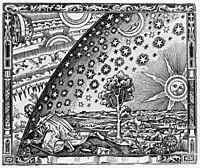Arcane Arts
| The Arcane Arts | |
|---|---|
 Beseeched of the Flammarion | |
| Abbreviation | TA |
| Type | Religion |
| Classification | Atheistic |
| Scripture | The Sorcerer, by Sage Pumpernickel |
| Governance | Franmark Academy |
| Language | Nisser |
| Headquarters | Franmark |
| Origin | 700CE |
| Other name(s) | The Arcane, Arcanism |
The Arcane Arts, also known as the Arcane or Arcanism, is the traditional system of beliefs within the Republic of Nisserige. In its modern form, the belief system originated in the 8th century CE when Sage Pumpernickel wrote about his mystical findings in an anthology titled The Sorcerer, which was the first written record of the belief system and helped standardize it across the greater Nisser region. The system likely has existed for centuries prior to the writing of Pumpernickel, spanning back to at least the 3rd century. During the era of Communist Nisserige, the religion faced prosecution in Flischer's attempt to create a perfectly secular Nisser nation. Despite his attempts, the Arcane Arts remains as Nisserige's most popular belief system.
Throughout the centuries, and even after the publication of The Sorcerer, the religion faced much internal conflict and disagreement, primarily between practitioners of differing Divinities, or followers of differing Houses. Despite these disagreements, there is still a tangible canon that is a collection of several writing by the Seven Wise Sages that is mostly agreed upon by the majority of Arcanists as truth.
Arcanism is often described as an atheistic religion because the religion does not have a divine figure or figures at its helm, and most practitioners of Arcanism do not believe in any god or pantheon. The most iconic belief of Arcanism is the belief in Magic, or the Arcane, as a natural force of the world similar to gravity. Much of the writings within Arcanism are focused on how practitioners can hone magic and use it in their everyday lives. Several motifs, symbols, and other icons surrounding magic have appeared consistently alongside the belief system across the centuries.
After the death of all of the Seven Sages, Arcanism usually had a Wizard at its helm. During the era of Communist Nisserige, Wizards were prosecuted, so many chose to go into hiding for several decades. At the end of the era in 1950, Arcanism no longer had any Wizards left and it transitioned more into a personal belief system detached from organization. During the 1980s and 90s, interest in the belief system began to rise, and many universities began offering theology courses in the Arcane. During this time, the title Sage resurfaced into use. This time, however, it was used to describe those who had pursued rigorous academic achievements in studying Arcanism rather than those who had authority over it. To avoid confusion over the Seven Sages of the past, the modern title was eventually changed to Sorcerer as a namesake of The Sorcerer.